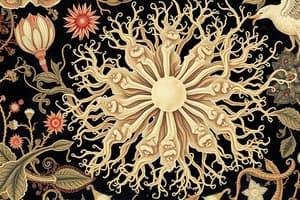Podcast
Questions and Answers
What is a common disadvantage of the agar-based media for Mycobacterium?
What is a common disadvantage of the agar-based media for Mycobacterium?
- It is difficult to examine colonies
- It requires extensive preparation
- Prolonged time of growth (correct)
- Contamination is common
Which of the following media are considered selective for Mycobacterium?
Which of the following media are considered selective for Mycobacterium?
- Lowenstein Jensen Media
- Gruft Modified Lowenstein Jensen (correct)
- Middlebrook 7H10
- Petragnani medium
Which media must always contain malachite green as per the media criteria?
Which media must always contain malachite green as per the media criteria?
- Dorset Egg media
- Middlebrook 7H11
- Egg-based medium (correct)
- Bactec 12B
Why must the media not be sterilized through autoclaving?
Why must the media not be sterilized through autoclaving?
Which medium is specifically recommended for the isolation of Mycobacterium avium complex?
Which medium is specifically recommended for the isolation of Mycobacterium avium complex?
Which virulence factor of Mycobacterium tuberculosis directly damages host cell mitochondria?
Which virulence factor of Mycobacterium tuberculosis directly damages host cell mitochondria?
What is the primary pathogenesis route for Mycobacterium tuberculosis after inhalation?
What is the primary pathogenesis route for Mycobacterium tuberculosis after inhalation?
What is indicated by a positive PPD Skin Test result in terms of immunologic response?
What is indicated by a positive PPD Skin Test result in terms of immunologic response?
Which pathological outcome occurs when there is both a high antigen load and a strong hypersensitivity reaction?
Which pathological outcome occurs when there is both a high antigen load and a strong hypersensitivity reaction?
Which observation would you expect to find in an X-ray of a patient with tuberculosis?
Which observation would you expect to find in an X-ray of a patient with tuberculosis?
What characteristic is unique to Mycobacterium marinum compared to other Mycobacterium species?
What characteristic is unique to Mycobacterium marinum compared to other Mycobacterium species?
What is a significant factor affecting the decolorization of Mycobacterium species after staining?
What is a significant factor affecting the decolorization of Mycobacterium species after staining?
Which of the following Mycobacterium species is known to be non-culturable?
Which of the following Mycobacterium species is known to be non-culturable?
In terms of growth rate, which type of Mycobacterium species is classified as a slow grower?
In terms of growth rate, which type of Mycobacterium species is classified as a slow grower?
Which component promotes the growth of pathogenic mycobacteria in culture?
Which component promotes the growth of pathogenic mycobacteria in culture?
Which test shows a positive result for M.kansasii?
Which test shows a positive result for M.kansasii?
What does a black color indicate in the Tellurite Reduction Test?
What does a black color indicate in the Tellurite Reduction Test?
Which organism is identified as a negative result on the Iron Uptake Test?
Which organism is identified as a negative result on the Iron Uptake Test?
Which statement about the Urease Test is accurate?
Which statement about the Urease Test is accurate?
Which results from the Pyrazinamidase Test differentiate M.marinum from M.bovis?
Which results from the Pyrazinamidase Test differentiate M.marinum from M.bovis?
What does the presence of >45mm height of effervescence indicate in the Catalase Test?
What does the presence of >45mm height of effervescence indicate in the Catalase Test?
Which organism shows a positive result in the Arylsulfatase Test?
Which organism shows a positive result in the Arylsulfatase Test?
What does a yellow color indicate in the Urease Test?
What does a yellow color indicate in the Urease Test?
What is the primary stain used in the Ziehl-Neelsen (Hot Method)?
What is the primary stain used in the Ziehl-Neelsen (Hot Method)?
Which method uses a heat mordant during the staining process?
Which method uses a heat mordant during the staining process?
What is the result of the Modified Kinyoun’s (Cold Method)?
What is the result of the Modified Kinyoun’s (Cold Method)?
Which decolorizer is used in the Ziehl-Neelsen (Hot Method)?
Which decolorizer is used in the Ziehl-Neelsen (Hot Method)?
What is the primary stain used for Fluorochrome Staining?
What is the primary stain used for Fluorochrome Staining?
Which test would produce a positive result indicated by a pink/red color?
Which test would produce a positive result indicated by a pink/red color?
Which type of bacilli is indicated by a positive result in the Fluorochrome Staining?
Which type of bacilli is indicated by a positive result in the Fluorochrome Staining?
In which method is the mordant Tergitol used?
In which method is the mordant Tergitol used?
Which of the following is a manner of reporting for negative results in AFB microscopy?
Which of the following is a manner of reporting for negative results in AFB microscopy?
Which of the following stains would be used for color-blinded persons?
Which of the following stains would be used for color-blinded persons?
Study Notes
General Characteristics of Mycobacterium spp.
- Slender, slightly curved or straight rod-shaped bacteria.
- Non-motile, non-spore forming; M. marinum is an exception.
- Difficult to stain; once stained, resistant to decolorization due to mycolic acid (high lipid content in cell wall).
- Acid-fast bacteria; increased CO2 enhances growth of some species.
- Pathogenic mycobacteria grow slower (2-6 weeks) than other species; require whole egg for growth, except M. leprae which is non-culturable.
Mycobacterium Groups
- Mycobacterium tuberculosis complex
- Includes M. tuberculosis (causes TB in humans), M. bovis (TB in cattle; intestinal TB in humans), M. africanum (TB in Africa), M. microti, and M. canetti.
- MOTT (Runyon’s Classification)
- Classified based on pigment production; rapid growers.
- Mycobacterium leprae
- Causative agent of leprosy, non-culturable.
Culture Media for Mycobacterium
- Non-Selective Media
- Egg-based medium, requires malachite green.
- Advantages include prolonged growth time for better detection.
- Agar Based Media
- Clear media for examination of colonies, growth in 10-12 days.
- Examples: Lowenstein Jensen Media, Middlebrook 7H10, and 7H11 with casein hydrolysis.
- Selective Media
- Contains antibiotics to inhibit non-target bacteria.
- Examples: Gruft Modified Lowenstein Jensen, Mitchinson Selective 7H11.
- Liquid Media
- For easier detection: Bactec 12B, Bactec 13A.
Staining Techniques
- Ziehl-Neelsen (Hot Method)
- Primary stain: Carbol Fuchsin.
- Decolorizer: Acid alcohol; counterstain with methylene blue.
- Results in red bacilli in a blue background.
- Modified Kinyoun’s (Cold Method)
- Uses Tergitol instead of heat; same decolorizer.
- Fluorochrome Staining
- Primary stain: Auramine rhodamine; results in yellow fluorescence.
- Other Stains
- Fite Faraco for biopsy tissues; Spergler’s for AFS.
Reporting Results
- Reporting methods vary based on microscopy techniques (Mahon/RITM, CDC).
- Categories range from "No AFB seen" to increasing levels of positivity based on field examinations.
Biochemical Tests
- Nitrate Reduction Test
- Positive for M. tuberculosis; detects enzyme conversion of nitrate.
- Niacin Test
- Positive for M. tuberculosis; tests conversion of niacin.
- Catalase Test
- Identifies heat-stable catalase in Mycobacterium complex.
- Pyrazinamidase Test
- Positive results for M. tuberculosis and M. marinum.
- Iron Uptake Test
- Detects rapid growers except M. chelonae.
- Others: Urease Test, Tween 80 Hydrolysis Test, and various inhibiting tests.
Mycobacterium tuberculosis Details
- Common names include Koch’s Bacillus and Tubercle Bacillus; known for “cauliflower-like” growth and cording.
- Virulence factors include cord factor (damages host mitochondria) and sulfatides (inhibits phagocytosis).
Clinical Infection and Pathogenesis
- Pathogenesis involves airborne transmission, with subsequent intracellular multiplication leading to a robust immune response.
- Key markers include increased monocytes and granulomatous lesions visible on X-ray.
- Differentiates between hard tubercles (low antigen with strong hypersensitivity) and tissue necrosis (high antigen levels).
Diagnosis
- Based on clinical symptoms, signs, and PPD skin test results.
- Positive PPD test indicates previous exposure or infection; various testing methods include Tuberculin, Mantoux, and Mendel’s Test.
Studying That Suits You
Use AI to generate personalized quizzes and flashcards to suit your learning preferences.
Description
This quiz explores the general characteristics of Mycobacterium species, focusing on their rod-shaped structure and unique staining properties. Participants will learn about the significance of mycolic acid and the implications of these traits in microbiology. Ideal for students studying microbiology or related life sciences.




